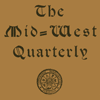
Mid-West Quarterly (1913–1918)
Date of this Version
1-15-1915
Document Type
Article
Abstract
It was the romanticists who tended to write poetry of “autobiography,” who inquired of themselves concerning themselves, and assumed that the world was interested in what they found. Nor was the habit of self-consciousness regarding the poetic office let drop by their successors. That the words poet and poetry were so often on Emerson’s lips would be evidence enough to students of literature, in its changing temper and shifting modes, of his probable localization in time. It is also evidence of his relation to certain European movements of thought to which he gave—comparatively late in their currency and much tempered —American expression. In his doctrine of the superiority and the aloofness of the poet, of the latter’s severance from others to whom he yet bears messages of light, in his self-sufficiency and his sovereignty, his belief in the intrinsic goodness of nature and of man, and his concern with poetic thought rather than poetic form, Emerson may be termed the American representative of ideas which already had had wide circulation in Europe. In great part they emanated from Rousseau, and some of them, especially the gospel of the rights and the supremacy of the individual, had metamorphosed the politics and the map of Europe as well as its literature.


Comments
Published in The Mid-West Quarterly, Volume II, no. 2, January 1915.